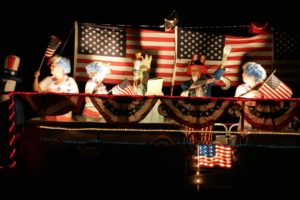Thanks to Schoolhouse Rock, I can no longer read the preamble to the Constitution. I must sing it.
“We the People … in order to form a more perfect Union, establish Justice, insure domestic Tranquillity, provide for the common defence, promote the general Welfare, and secure the Blessings of Liberty to ourselves and our Posterity, do ordain and establish this Constitution for the United States of America.”
As a child, I was quite addicted to the various Schoolhouse Rock videos that aired on Saturday morning television. In fact, “Conjunction Junction” and “Three Is a Magic Number” can be found in my playlists. Still, it wasn’t until they were repackaged in the late 1990s that I realized some of their more subtle lessons.
In the “Preamble” video there is a line of people casting ballots into a box. Last in line is a girl in a pink dress and bonnet. Her ballot is not cast; she can’t reach the box.
When the chorus repeats, the scenes are modern. The box is replaced with a voting booth. A woman and young girl are at the back of the line. The woman briefly steps behind the curtain before exiting with the girl.
Obviously, this isn’t in-your-face, ERA propaganda, but even such a hinting acknowledgment of women as second-class citizens was rare then, especially as part of children’s programming.

The video was a first for Schoolhouse Rock. That is, it was the first time music and lyrics were written by and performed by a woman. While Lynn Ahrens created other songs in the series, her “Preamble” involvement was a fluke. According to an interview last year, Ahrens was working as a secretary and playing her guitar during her lunch hour when George Newall, a producer, walked by and asked if she’d consider writing a song.
“It was dumb luck — being in the right place at the right time with the right person passing by,” she said.
It isn’t so surprising that women’s historical concerns weren’t readily pulled into pop culture. Women weren’t considered as important as men, and weren’t afforded the same opportunities. And, even when circumstances changed, men continued to dominate art, business and academia.
Many of the women known from the same time period as our “Founding Fathers,” stand out because they were attached to certain men, were in the right place at the right time or because their stories serve as cautionary tales.
Phillis Wheatley, for example, was a slave purchased by John Wheatley of Boston for his wife, Susanna. But due to the slave’s frail health, Susanna instead mentored her, teaching English, Latin and theology. Phillis became the first slave and first black American to publish a book of poetry, “Poems on Various Subjects, Religious and Moral.” She was only the third American woman to do so.
Local men questioned if a woman of such low standing could have produced words so fine, forcing Phillis to defend her abilities in court. She died at age 31, never having published a second volume.
Abigail Adams, wife of John Adams, is remembered as an enterprising farmer, who influenced her husband’s political leanings. She famously asked John to “remember the ladies” while crafting the Declaration of Independence.
John, who would later become the second U.S. President, could not have achieved his status as a statesman or a Founding Father if Abigail had not managed their land. She kept the family afloat and functioning while John abandoned his law practice to serve in the Continental Congress.
These are the stories that weren’t included in grade school history books, mostly because men wrote them. For the same reason, they weren’t the subject of early books, poetry or other literature. When documentaries came into fashion, male film makers were most interested in male subjects. No, not necessarily because of sexism, but because people generally gravitate toward, hire and want to be around people most like themselves.
These days, we talk a great deal about diversity, even if we don’t always achieve it. We understand the value of hearing and including different points of view.
I hope such sensibilities also will be applied to Independence Day celebrations, so we will begin to view our “ Founding Mothers ” as favorably as our fathers.
This column by Lynda Waddington originally published in The Gazette on July 4, 2015. Photo credit: Cliff Jette/The Gazette
